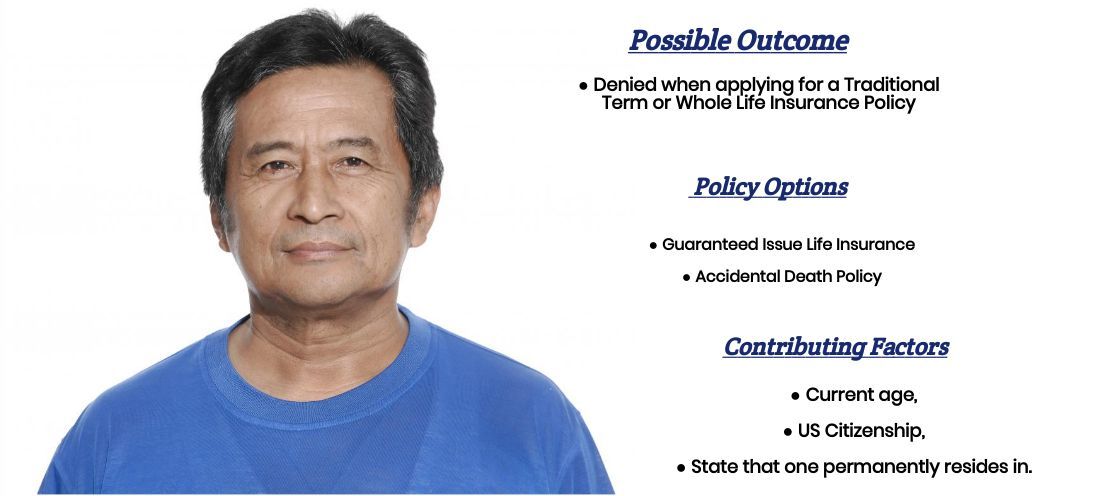In this article, we aim to answer some of the most common questions we receive from individuals who have been diagnosed with Congestive Heart Failure or Chronic Heart Failure and are now applying for life insurance.
Some of the questions we will cover include:
- Is it possible to qualify for life insurance with a diagnosis of Chronic Heart Failure?
- Why do life insurance companies take into consideration a diagnosis of Chronic Heart Failure?
- What information will insurance companies ask for or be interested in?
- What “rate” can you qualify for?
- What steps can you take to ensure that you obtain the best life insurance policy for your needs?
Without further delay, let’s dive in!
Can I qualify for life insurance if I have been diagnosed with Cardiac Heart Failure?
Unfortunately, individuals who have been diagnosed with Congestive Heart Failure or chronic cardiac heart failure will not be able to qualify for a traditional term or whole life insurance policy. This is because chronic heart failure is a very serious medical condition and one that can ultimately cause one to die prematurely.
That said, however…
Most of the best life insurance companies (in our opinion) will still inquire about one’s condition before making a decision about one’s life insurance application because in some cases an individual may have been diagnosed with heart failure at some point in their life only to have their condition improve later on due to some treatment that they may have received.
Why do life insurance companies care if I have been diagnosed with Chronic Heart Failure?
Life insurance companies are in the business of assessing risk. When they evaluate an applicant for life insurance, they consider many factors that can affect an individual’s life expectancy, such as age, gender, occupation, lifestyle habits, and medical history.
Chronic Heart Failure is a serious medical condition that affects the heart’s ability to pump blood efficiently. As a result, it can increase the risk of other health complications and mortality. For this reason, life insurance companies will take a history of Chronic Heart Failure into account when determining an applicant’s risk profile and eligibility for coverage.
In short, life insurance companies care about a history of Chronic Heart Failure because it is a significant health risk factor that can impact an individual’s life expectancy and, therefore, the likelihood of a future payout.
Chronic heart failure is defined as:
Chronic heart failure, also known as congestive heart failure, is a serious medical condition in which the heart is unable to pump enough blood to meet the body’s needs. It is a chronic condition, meaning it is long-lasting and may get worse over time.
Chronic heart failure can be caused by a variety of factors, including:
- coronary artery disease,
- high blood pressure,
- and diabetes.
It can also be caused by other conditions that damage the heart muscle, such as viral infections or alcohol abuse.
People with chronic heart failure may experience a range of symptoms, including:
- shortness of breath,
- fatigue,
- and swelling in the legs and ankles.
Suffering from Chronic Heart Failure can also cause a wide variety of other medical conditions throughout the body, including kidney and liver damage.
But here’s the thing…
When it comes to how a life insurance company will “view” someone who has been diagnosed with Heart Failure before they just “automatically” deny coverage, some insurance companies will want to investigate further to determine whether or not you will “always” be ineligible for coverage. You see, there are a variety of conditions that could cause one to suffer from Heart Failure, which can either be “cured” or treated to the point where an individual might not meet the “definition” of what it is to actually have CHRONIC Heart Failure.
For example…
Your heart failure may be due to:
- An infection that can be treated.
- An allergic reaction,
- An arrhythmia,
- Artery blockages,
- Etc…
This is why…
Even when an individual has been diagnosed with Cardiac Heart Failure, we here at IBUSA like to ask a series of questions so that we can fully rule out the possibility that an individual won’t be able to qualify for a traditional term or whole life insurance policy and also try and determine if there might be a point in time later on when their current health condition may change.
What kind of information will the insurance companies ask me or be interested in?
When applying for life insurance with a history of Chronic Heart Failure, insurance companies will ask you to provide detailed medical information, including:
- Your diagnosis: The insurer will want to know the specific type of heart failure you have been diagnosed with, such as Congestive Heart Failure or Chronic Heart Failure.
- Your medical history: They will ask for a complete medical history, including any prior hospitalizations, procedures, medications, or other treatments related to your heart condition.
- Your current treatment plan: The insurer will want to know about any current medications you are taking to manage your heart condition, as well as any lifestyle changes or other therapies you are following.
- Results from medical tests: The insurance company may request copies of recent medical tests or exams, such as electrocardiograms, echocardiograms, or stress tests, to assess your current health status.
- Other health and lifestyle factors: In addition to your heart condition, the insurer may ask about other health factors, such as family medical history, smoking history, and alcohol consumption.
Based on this information, the insurance company will evaluate your risk profile and determine your eligibility for coverage. They may also adjust the policy’s premiums, coverage amounts, or other terms based on your health risks. It’s essential to provide accurate and complete information to ensure a fair and accurate evaluation of your application.
What “rate” can I qualify for?
As one can see, many “potential” factors can come into play when trying to determine what “kind” of life insurance policy an individual may be able to qualify for and what “rate” they may be eligible for. For this reason, it’s pretty much impossible to know for sure what kind of “rate” you might be able to qualify for after having been diagnosed with Congestive Heart Failure without first speaking with you directly.
That said, however…
There are a few “assumptions” that we can make that will generally hold true. For example, if you are currently suffering from congestive heart failure, and it does not appear that your condition is going to change any time soon, it’s safe to say that you will not be able to qualify for a traditional term or whole life insurance policy right now.
Which means that…
You’re either going to need to apply for coverage once your condition improves or seek out some kind of “alternative” product, such as a guaranteed issue life insurance policy or an accidental death policy, which won’t require you to have to take a medical exam or answer any health-related questions in order to be able to qualify for coverage.
Now, as for those…
Who have been diagnosed with Cardiac Heart Failure in the past but are no longer suffering from Cardiac Heart Failure, there is a “chance” that you may be able to qualify for a traditional life insurance policy. Still, as one can imagine, these are not always the easiest applications to find a “home” for.
The good news is…
That regardless of your situation, we here at IBUSA can help because we have tons of experience helping folks with all sorts of pre-existing medical conditions like yours and are committed to helping all of our clients find the “best” life insurance policy that they can qualify for.
Which brings us to the last topic that we wanted to take a moment and discuss, which is…
What can I do to help ensure that I get the “best life insurance” for me?
Here are some tips to help you obtain the best life insurance policy when you have a history of Chronic Heart Failure:
- Work with an experienced agent or broker: An experienced agent or broker can help you navigate the complex process of applying for life insurance with a history of Chronic Heart Failure. They can provide guidance on the best insurance companies to work with, the type of policy that suits your needs, and help you compare rates and coverage options.
- Be honest and accurate in your application: It’s crucial to provide accurate and complete information on your application. This includes your medical history, current treatment plan, medications, and lifestyle habits. Providing incomplete or inaccurate information can lead to a denied application or an invalidated policy.
- Be proactive about managing your condition: Taking steps to manage your heart condition, such as following your treatment plan, making healthy lifestyle choices, and regularly monitoring your health, can help you demonstrate to the insurer that you are committed to managing your condition and reducing health risks.
- Consider a guaranteed issue policy: If you have been denied coverage in the past or are unable to obtain traditional life insurance due to your heart condition, a guaranteed issue policy may be an option. These policies have minimal underwriting requirements and may be easier to obtain, although they often have lower coverage amounts and higher premiums.
- Compare rates and coverage options: It’s essential to shop around and compare rates and coverage options from different insurers. Don’t settle for the first policy that comes your way. Take the time to evaluate multiple options and choose the policy that best fits your needs and budget.
By following these tips, you can increase your chances of obtaining the best life insurance policy for your needs, even with a history of Chronic Heart Failure.




Very informative thank you
Curtis,
We’re glad you found our article helpful.
Thanks,
InsuranceBrokersUSA